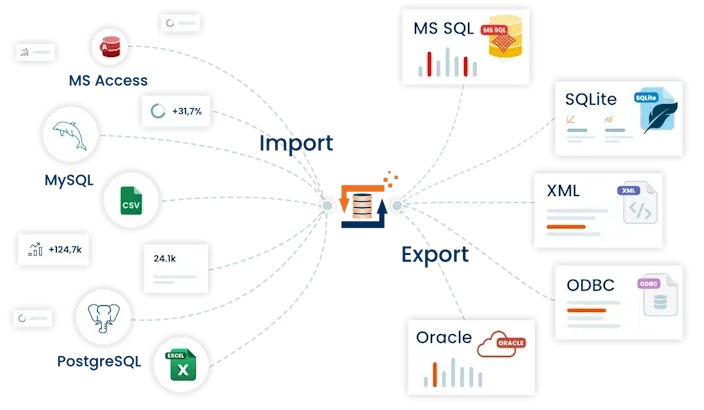- Posts: 447
Read side SQL: Extracting only the latest row
- FlowHeater-Team
-
 Topic Author
Topic Author
- Offline
- Admin
-

Less
More
15 years 1 week ago #2024
by FlowHeater-Team
Best wishes
Robert Stark
Read side SQL: Extracting only the latest row was created by FlowHeater-Team
Translated submission in the German forum. You can read the original entry here:
Read-Seite SQL: Nur letzten Wert anzeigen
Hi,
I have an MS-SQL database where the data is merged from two tables. This works fine using the following SQL script on the READ side:
Depending on the number of entries, F_RP.TP_ID can appear any number of times. However, I always only need the last entry, which I can determine from F_RP.R_DATE.
How can I get FlowHeater to just load the last entry by itself? Do I have to do that in SQL or can it be easily achieved using a Heater?
Thanks and greetings,
Nick
Hi,
I have an MS-SQL database where the data is merged from two tables. This works fine using the following SQL script on the READ side:
Code:
SELECT F_TP.T_SU, F_TP.T_ME, F_RP.R_ME, F_RP.R_DATE, F_RP.TP_ID
FROM LoTr.dbo.F_RP F_RP, LoTr.dbo.F_TP F_TP
WHERE F_RP.CAT_ID = F_TP.CAT_ID AND F_RP.F_ID = F_TP.F_ID AND F_RP.TP_ID = F_TP.TP_ID AND ((F_TP.T_STATUS=1) AND (F_RP.R_ME Not Like '%WV%' And F_RP.R_ME Not Like '%II%' And F_RP.R_ME Not Like '%VA%'))
ORDER BY F_TP.T_SU
Depending on the number of entries, F_RP.TP_ID can appear any number of times. However, I always only need the last entry, which I can determine from F_RP.R_DATE.
How can I get FlowHeater to just load the last entry by itself? Do I have to do that in SQL or can it be easily achieved using a Heater?
Thanks and greetings,
Nick
Best wishes
Robert Stark
Please Log in or Create an account to join the conversation.
- FlowHeater-Team
-
 Topic Author
Topic Author
- Offline
- Admin
-

Less
More
- Posts: 447
15 years 1 week ago #2025
by FlowHeater-Team
Best wishes
Robert Stark
Replied by FlowHeater-Team on topic Re:Read side SQL: Extracting only the latest row
Hi Nick,
You can do this with the GroupBy Heater . Drag and drop the GroupBy Heater onto the Designer window and connect it to your field F_RP.TP_ID. To enable it to function properly you also have to modify the ORDER BY clause in the SQL SELECT statement. In your case, for example:
order by F_TP.T_SU, F_RP.TP_ID, F_RP.R_DATE
It is important that all "F_RP.TP_ID" fields that are to be grouped are delivered to FlowHeater in sequence. The GroupBy Heater then combines all identical values to a single row on the WRITE side. Note that if instead of the last entry, you wish to determine the first value, it is simply necessary to modify the Order by clause, by adding DESC (meaning descending) after the date field. For example:
order by F_TP.T_SU, F_RP.TP_ID, F_RP.R_DATE DESC
You can do this with the GroupBy Heater . Drag and drop the GroupBy Heater onto the Designer window and connect it to your field F_RP.TP_ID. To enable it to function properly you also have to modify the ORDER BY clause in the SQL SELECT statement. In your case, for example:
order by F_TP.T_SU, F_RP.TP_ID, F_RP.R_DATE
It is important that all "F_RP.TP_ID" fields that are to be grouped are delivered to FlowHeater in sequence. The GroupBy Heater then combines all identical values to a single row on the WRITE side. Note that if instead of the last entry, you wish to determine the first value, it is simply necessary to modify the Order by clause, by adding DESC (meaning descending) after the date field. For example:
order by F_TP.T_SU, F_RP.TP_ID, F_RP.R_DATE DESC
Best wishes
Robert Stark
Please Log in or Create an account to join the conversation.
Time to create page: 0.264 seconds

